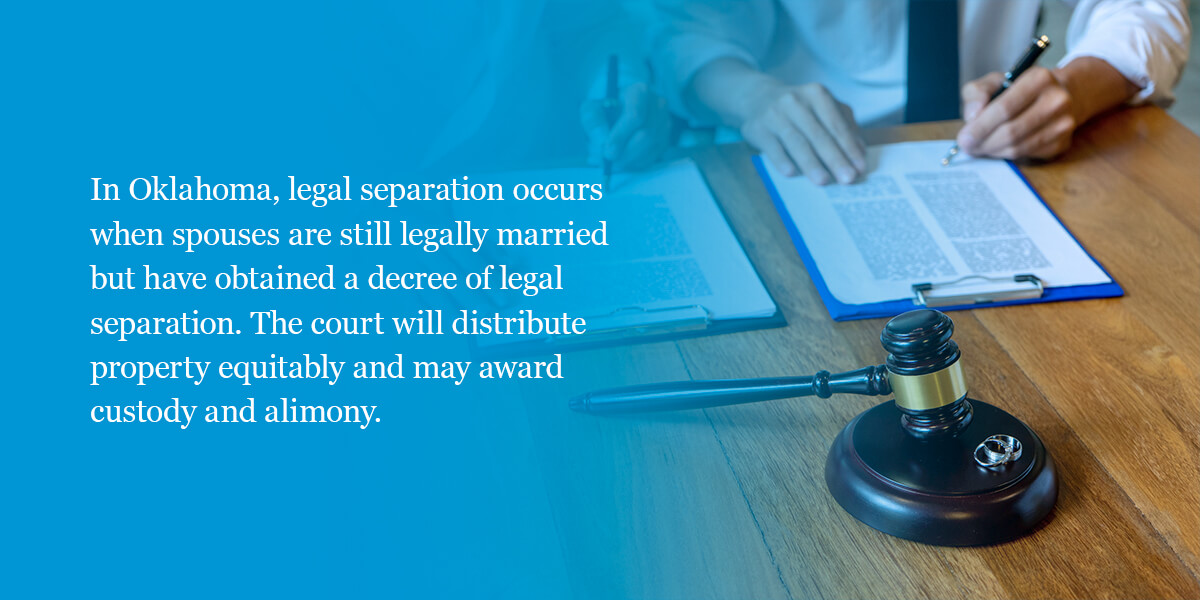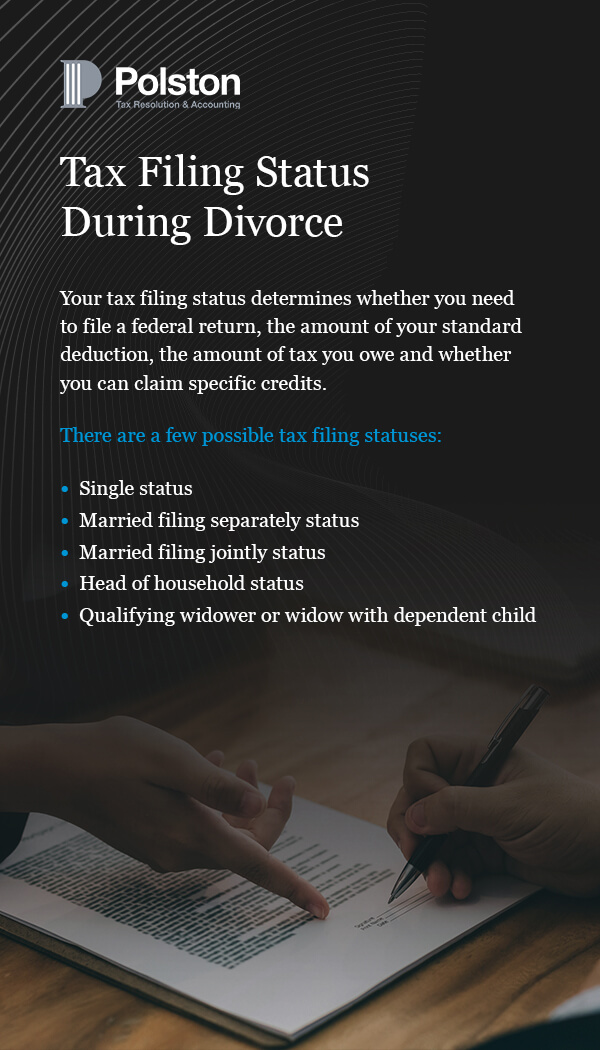
Divorce can be a stressful time, and while money is a central issue of many divorces, changes in your tax status often fall by the wayside. Many separated or divorced couples are more concerned about child custody, alimony and how large assets like homes will be divided. However, a divorce can significantly impact your tax situation and your personal finances, so it’s essential to consider how your taxes will be affected during and after your divorce.
There are a few important considerations to make that can keep you on top of your tax situation and needs. At Polston Tax Resolution & Accounting, it’s our job to always look out for our clients, especially when you’re going through something as difficult as divorce. When you partner with us to file your taxes after divorce, we will ensure that your transition is as smooth and straightforward as possible.

In Oklahoma, legal separation occurs when spouses are still legally married but have obtained a decree of legal separation. The court will distribute property equitably and may award custody and alimony. For many couples, obtaining a decree of legal separation is simpler because it resolves many of the issues addressed during a divorce and can be filed during the statutory waiting period to obtain a divorce.
But the IRS considers you married for the entire tax year unless you file for divorce by December 31. So while separated, you cannot file taxes under “single” or “head of household,” but rather under “married filing jointly” or “married filing separately.” Filing separately can mean paying more taxes, but filing jointly can mean that you share responsibility with your spouse. In other words, if your spouse fails to file taxes, you will be liable. So while separated, be careful how you choose to file taxes.
If you’ve obtained a decree of separate maintenance, one spouse can continue to support the other before, during and after separation, but you are still legally married and must file taxes jointly or separately. Reach out to a tax attorney at Polston Tax so we can handle your taxes and simplify the process for you to ensure everything is correct.
After a divorce, taxes and filing status change. When you file your taxes, you may not be able to claim deductions for court costs and legal fees. If you choose to change your name after divorce, notify the Social Security Administration, as the name on your tax form must match their records.

Your tax filing status determines whether you need to file a federal return, the amount of your standard deduction, the amount of tax you owe and whether you can claim specific credits. There are a few possible tax filing statuses:
Your tax filing status will depend on when the divorce is finalized. If your divorce is complete before or on December 31, you cannot file jointly. If your divorce is finalized after the start of the new year, you will still be considered married to the IRS and you can file a joint tax return. You can also opt for married filing separately status.
Filing jointly can be advantageous while you are still married, as you may be able to claim a higher standard deduction. If you cannot file a joint tax return, you may be able to file as head of household, which could also save you money. Keep in mind, however, that only one of you can file as a head of household.
To file as a head of household, you must be single, divorced or legally separated by the final day of the year. You must also have paid most of the costs for keeping up your home for the year, including food, homeowners insurance, real estate taxes, utilities and repairs. You must also have been living with an eligible dependent, such as a child, for more than half of the year.
If you need further guidance regarding your tax filing status during divorce, reach out to us at Polston Tax.
Though previously deductible before the Tax Cuts and Jobs Act (TCJA), alimony payments can no longer be deducted by the payer on a tax return. Similarly, alimony payments cannot be included as income by the recipient. Additionally, if you pay child support, you cannot deduct these payments. If you are the parent receiving child support, you will not report it as part of your income.

If your marriage includes children, this could make the divorce and your taxes more complicated. In Oklahoma, the IRS considers the parent who cares for the child for the majority of the year to have primary custody. This is the parent who can claim the exemption for the child. In Oklahoma, the non-custodial parent can claim an exemption for the child via the child tax credit as well by using IRS form 8332 and attaching the form to his or her tax return.
Non-custodial parents, however, cannot claim a child for the American Opportunity Tax Credit (AOTC), the child and dependent care credit or the earned income tax credit (EIC). Child support payments are not deductible, and if you receive child support, it is not taxable.
Whether you are a custodial or non-custodial parent, you can claim medical expenses for your child via the medical expense deduction. At Polston Tax, we can help you file your taxes after a divorce involving children.
Divorce can be a challenging process, but we hope these tips will help clear up some confusion and allow you to focus on your family during this time. Divorce laws can be complex and vary from state to state, which is why so many taxpayers turn to us at Polston Tax to handle both complicated and common tax situations. We will be sure to discuss the specifics of your situation and customize our services to your needs.
At Polston Tax, we have five offices that allow us to serve clients nationwide. We service taxpayers who owe back taxes and those who need more advanced tax resolution options like installment agreements, offers in compromise and levy releases. When you choose us, you’ll be assisted by a team of more than 100 CPAs, tax attorneys, accountants and tax preparers.
If you have any further questions or are seeking tax representation, be sure to browse our services page and fill out the form for a free consultation. Or give us a call at 405-801-2146. We’re open 8 a.m. to 5 p.m. Central with convenient locations across Oklahoma, including Oklahoma City, Tulsa, Edmond, Norman, Yukon and Lawton.